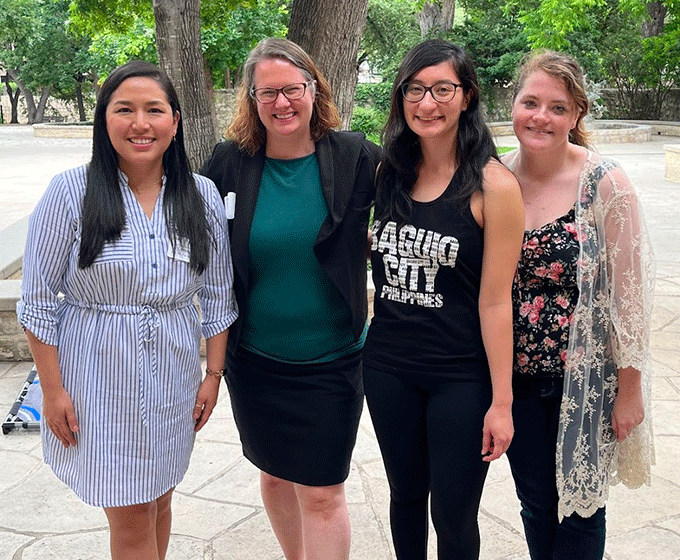
Professor Lacy Barton (second from left) leads the Barton Lab at UTSA, training undergraduates, graduate students and postdoctoral scientists to carry out research on germline and ovary/testis development.
MARCH 13, 2024 — Fertility requires proper development of egg and sperm. This development begins with an epic journey of egg and sperm precursors called primordial germ cells from their place of origin to the future ovaries and testes.
“Across the animal kingdom, this journey is an essential step in fertility,” said Lacy Barton, an assistant professor in the UTSA Department of Neuroscience, Developmental and Regenerative Biology. “In humans, failure to migrate to the ovary or testes can compromise fertility and lead to the formation of germ cell tumors.”
But how do primordial germ cells reach their target? Barton, a reproductive developmental biologist, wanted to learn more.
Barton and her research team narrowed in on a class of small molecules, called juvenile hormones. Scientists previously believed these hormones only functioned later in development, but there were hints that these hormones could be present around migrating primordial germ cells.
To follow these clues, Barton and her team made hormone biosensors and found juvenile hormones were indeed present and active at this new place and time in development. They used CRISPR-mediated gene editing and discovered juvenile hormones are required for primordial germ cells to reach their ovary or testes target. They also developed methods to isolate primordial germ cells and found these cells will migrate whenever they are given juvenile hormones.
“We discovered an unexpected function for hormone signaling and this discovery has opened the door to lots of questions that my team is excited to explore,” Barton said.
Barton’s study is published in Current Biology, a peer-reviewed scientific journal that publishes research findings of broad interest in the life sciences. Barton’s work was funded by the Damon Runyon Cancer Research Foundation and National Institutes of Health’s K99/R00 postdoctoral fellowships. Her research at UTSA is currently supported by a $750,000 grant from the NIH Eunice Kennedy Shriver National Institute of Child Health & Human Development, start-up funds from the UTSA College of Sciences, and a Grant for Research Advancement and Transformation (GREAT) seed grant from the UTSA Office of Research.
Barton joined UTSA as an assistant professor in 2022 with over 15 years of experience in germline research. She has investigated everything from primordial germ cells to oocytes and sperm, as well as the ovary and testis. She leads the Barton Lab, which explores how egg and sperm precursors fulfill their unique potential to generate fertile and healthy offspring.
The Barton Lab at UTSA trains undergraduates, graduate students and postdoctoral scientists to carry out fundamental research on germline and ovary/testis development. They combine classic genetic techniques with advanced microscopy and molecular biology to thoroughly analyze and answer scientific questions. Additionally, the researchers utilizes the equipment and expertise of the university’s Genomics Core and Cell Analysis Core. The environment is providing the students with the knowledge and skills they need become career-ready Roadrunners who are prepared to succeed in the workforce.
UTSA Today is produced by University Communications and Marketing, the official news source of The University of Texas at San Antonio. Send your feedback to news@utsa.edu. Keep up-to-date on UTSA news by visiting UTSA Today. Connect with UTSA online at Facebook, Twitter, Youtube and Instagram.
After getting your student settled in their room, connect with other UTSA families at our Family Get Together. Attendees need to RSVP for the event.
Rock & Brews Restaurant - 5702 Landmark Pkwy, San Antonio, TX 78249Late Night at the Rec is an awesome UTSA tradition that turns a typical information session into an exciting night of fun. It's a unique opportunity to meet new people and reconnect with old friends.
Campus RecreationCheer on the UTSA Soccer team as they take on Lamar in the first home game of the season.
Park West FieldShow your UTSA pride with our spirited crew—Rowdy, Cheer, the Spirits of the Roadrunner, and the incredible Spirit of San Antonio Marching Band (SOSA)—as we light up the night in true Roadrunner style.
Main Campus East Lawn, Main CampusAnnual Giving will host a First Day of School celebration to welcome students back to campus. We will have giveaways and photo opportunities.
Sombrilla Plaza, Main CampusEnjoy snacks while connecting with Adobe reps and student ambassadors. Download or log into the Adobe Express app to snag swag and unlock exclusive back-to-school templates. It’s a fun, fast way to get creative and start the school year with bold moves.
Central Plaza, Main CampusCelebrate the merger of UTSA and UT Health San Antonio with a pop-up featuring free t-shirts, exclusive swag, and interactive photo opportunities. Open to all students, faculty and staff. Supplies are limited!
Sombrilla Plaza, Main CampusThe University of Texas at San Antonio is dedicated to the advancement of knowledge through research and discovery, teaching and learning, community engagement and public service. As an institution of access and excellence, UTSA embraces multicultural traditions and serves as a center for intellectual and creative resources as well as a catalyst for socioeconomic development and the commercialization of intellectual property - for Texas, the nation and the world.
To be a premier public research university, providing access to educational excellence and preparing citizen leaders for the global environment.
We encourage an environment of dialogue and discovery, where integrity, excellence, respect, collaboration and innovation are fostered.